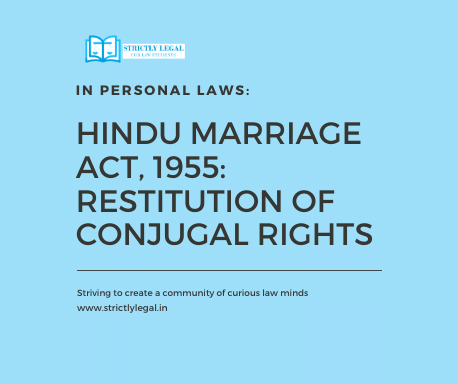Section 9 of the Hindu Marriage Act, 1955, deals with the subject of the restitution of conjugal rights.
It provides as follows: “When either the husband or the wife has, without reasonable excuse, withdrawn from the society of the other, the aggrieved party may apply, by petition to the District Court, for restitution of conjugal rights and the court, on being satisfied with the truth of the statements made in such petition and that there is no legal ground why the application should not be granted, may decree restitution of conjugal rights accordingly”. [read Hindu marriage, 1955 bare act]
By the Marriage Laws (Amendment) Act, 1976 (Act No. 68 of 1976), clause (ii) of Section 9 has been omitted and an explanation has been added to it, which provides that – “Where a question arises whether there has been reasonable excuse for withdrawal from the society, the burden of proving reasonable excuse shall be the person who has withdrawn from the society”.
Thus under this section, the court may decree for restitution of conjugal rights, when –
(a) Either of the party has, without reasonable excuse, withdrawn from the society of the other;
(b) The court is satisfied of the truth of the statements made in the petition for restitution of conjugal rights; and
(c) There is no legal ground why the application should not be granted.
In a petition for restitution of conjugal rights, if the aggrieved spouse proves withdrawal from the society by the defending spouse, the defending spouse must go ahead and prove that he or she had a reasonable excuse for such withdrawal: decree for restitution of conjugal right must follow because that is the normal state of husband and wife contemplated by Hindu marriage [Mrs. Manjula Zaerailal v. Zaerailal Vithal Das, A.I.R. 1975 Guj. 158].
To sustain a petition under section 9, the petitioner has to establish that respondent has withdrawn from the society of the petitioner. Thus where the wife was brought to stay in her paternal house by the husband, it was held that long silence, unresponsive attitude and cold indifference on the part of the husband is sufficient to establish that it is the husband who has abandoned his wife and the wife is entitled for a decree under section 9.
Where the petitioner wife herself alleged her husband has suppressed his first marriage and it was subsisting, it was held that her marriage being illegal, petition for restitution of conjugal rights was not maintainable [Smt. Ranjana Kejriwal v. V. K. Kejriwal, A.I.R. 1997 Bom. 380].
“This is a fundamental rule of matrimonial law that one spouse is entitled to the society and comfort consortium of the other spouse and where either spouse has abandoned or withdrawn from the society of the other without reasonable or just cause the other spouse has a right to bring a suit for restitution of conjugal rights”.
Under section 9 of the Hindu Marriage Act, 1955, a husband cannot compel his wife in service in another town to give up her job and live with him, because she has not withdrawn from the society of others without reasonable excuse. If the husband has time can go to his wife where she is serving and if the wife has time she can go to her husband also a petition filed by the husband under section 9 of the Hindu Marriage Act, 1955 for restitution of conjugal rights was decreed by the trial court in 1971.
Appeal filed by the wife before the High Court was dismissed and Letters Patent appeal filed by her was also dismissed by the High Court on 10-4-1973. Thereafter on 11-9-1977, the husband filed a petition for divorce. The divorce was sought on the ground that the decree for restitution of conjugal rights obtained by the husband remained unsatisfied due to non-compliance by the wife for more than two years.
In the written statement the wife admitted that there was a final decree for restitution of conjugal rights in existence but she took a plea that the decree could not be complied with because the husband had entered into another marriage.
The trial court held that the factum of second marriage was not proved and accepted the petition and a decree for divorce was passed. In appeal by the wife, a single judge of the High Court reversed the finding and dismissed the petition for divorce.
The husband filed a Letters Patent Appeal. Held that the finding of fact arrived at by the single judge was wrong and hence it was liable to be set aside.
Defences by wife to a petition of conjugal rights
A Hindu wife can take following defences in a petition of restitution conjugal rights filed by her husband against her.
Desertion: Where the husband has deserted the petitioner for a continuous period of not less than two years immediately preceding the presentation of the petition.
Cruelty: Where the husband has treated the petitioner with such cruelty as to cause a reasonable apprehension in the mind of the wife that it will be harmful or injurious for her to live with the husband.
Leprosy: Where the husband has, for a period of not less than one year immediately preceding the presentation of the petition, been suffering from of leprosy.
Venereal diseases: Where the husband has immediately before the presentation of the petition been suffering from venereal disease in a communicable form.
Unsoundness of mind: Where the husband has been continuously of unsound mind for a period of not less than two years immediately preceding the presentation of the petition.
Adultery: Where the husband has, after the solemnization of the marriage, sexual intercourse with any other woman.
A law student who has knowledge of numbers. A nerd who invests his ideas in new things.

Very nice information